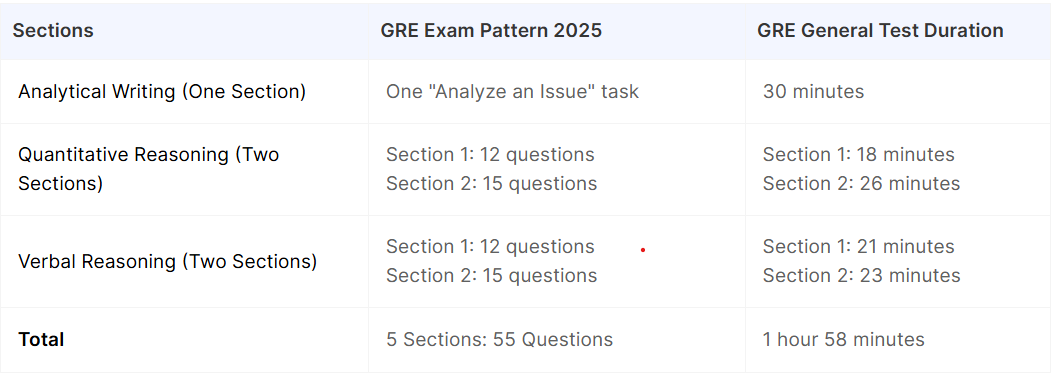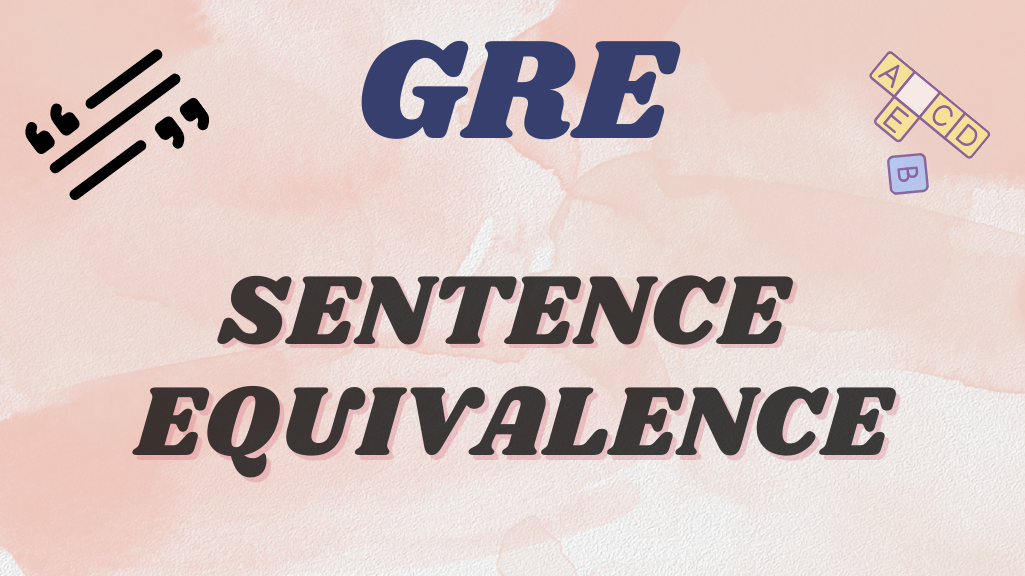Hey There! Let’s Tackle GRE Sentence Equivalence Together.
The GRE can feel like a beast, but don’t worry—you’ve got this! One of the trickiest (yet totally doable) parts of the Verbal Reasoning section is Sentence Equivalence. If you’re wondering what it is and how to ace it, you’re in the right place.
So, What is Sentence Equivalence?
Picture this: You get a sentence with one blank, and six answer choices. Your job? Pick two words that fit the blank and give the sentence the same meaning. Sounds simple, right? Well, there’s a twist—you can’t just pick synonyms. Both words need to maintain the context and tone of the sentence.
Example:
The professor’s lectures were so ______ that many students fell asleep within minutes.
(A) captivating
(B) soporific
(C) invigorating
(D) monotonous
(E) dull
(F) stimulating
Correct Answer: (B) soporific, (E) dull
Why? Because both words suggest the lectures were boring and sleep-inducing. "Monotonous" might seem close, but it doesn’t quite scream "puts you to sleep" the same way.

Types of Sentence Equivalence
1. Synonymous Sentences - I & II
This section focuses on understanding how different word choices can create the same overall meaning in a sentence. Some words are not perfect synonyms but work contextually.
Key Strategies:
Look beyond dictionary definitions – Consider words in context.
Ensure both words maintain the sentence’s tone and meaning.
Watch out for trap answers – words that seem similar but don't fit the context.
Example:
The CEO’s speech was so ______ that even the most impatient employees listened attentively.
(A) engaging
(B) tedious
(C) mesmerizing
(D) insipid
(E) enthralling
(F) dullCorrect Answer: (A) engaging, (E) enthralling
Both words suggest the speech was captivating, which aligns with employees listening attentively.
2. Beware of the Pseudo-Synonyms
A major challenge in Sentence Equivalence is pseudo-synonyms—words that appear similar but do not result in the same sentence meaning.
Common Mistakes:
Confusing connotation: "Arrogant" and "confident" may seem similar but have different tones.
Ignoring context clues: Words like "despite," "however," and "although" can change the meaning of the sentence.
Choosing a word without a matching pair: Even if one word seems perfect, if there’s no proper second choice, it’s wrong.
Example:
The scientist’s explanation was so ______ that even non-experts could easily grasp the concept.
(A) abstruse
(B) esoteric
(C) lucid
(D) perplexing
(E) transparent
(F) inscrutableCorrect Answer: (C) lucid, (E) transparent
Both words mean "easy to understand." Words like "esoteric" and "abstruse" seem related but actually mean "difficult to understand."
3. Avoiding Pseudo-Synonyms: Practice Activities
A great way to avoid pseudo-synonyms is through active practice.
Make word lists of commonly confused words (e.g., misanthropic vs. cynical).
Use words in sentences to understand their nuances.
Group words by tone (e.g., positive, negative, or neutral).
Mini Exercise:
Find the correct pair for:
His remarks were so ______ that they left the audience feeling uneasy.
(A) tactless
(B) considerate
(C) brash
(D) gentle
(E) blunt
(F) diplomaticCorrect Answer: (A) tactless, (E) blunt
Both words convey a lack of sensitivity, fitting the tone of the sentence.
4. “Perfect Answer” But No Matching Pair
Some questions include a perfectly fitting word but lack a second viable choice. If this happens:
Don’t force a second word.
Check if the meaning changes with another word.
Look for a synonym pair rather than just a perfect fit.
Example:
Her argument was so ______ that even the most skeptical audience members were convinced.
(A) compelling
(B) unconvincing
(C) persuasive
(D) disingenuous
(E) irrefutable
(F) weakTrap Answer: (E) irrefutable—this seems like a great choice, but there is no perfect second word to pair it with.
Correct Answer: (A) compelling, (C) persuasive
Both mean "convincing," making them the best match.

5. More than One Pair of Synonyms in the Answer Choices
Sometimes, there are multiple possible synonym pairs in the answer choices. The key is choosing the pair that best fits the sentence’s overall meaning.
Example:
The lawyer’s arguments were so ______ that the jury remained unconvinced.
(A) forceful
(B) cogent
(C) dubious
(D) questionable
(E) compelling
(F) weakCorrect Answer: (C) dubious, (D) questionable
Both words suggest a lack of credibility.
6. SE Questions with Only Two Synonyms
Some questions only have one correct pair of synonyms among the six choices. To approach these:
Identify the sentence’s tone early on.
Quickly eliminate non-matching words.
Double-check that your selected words truly work together.
Example:
His decision to leave the company was seen as ______ by his colleagues, who believed he had no better options.
(A) impulsive
(B) reckless
(C) strategic
(D) calculated
(E) hasty
(F) thoughtfulCorrect Answer: (A) impulsive, (E) hasty
Both words suggest the decision was made without careful thought.

Strategies for Sentence Equivalence
1. Get the Gist of the Sentence First
Before you even glance at the answer choices, read the sentence carefully. Ask yourself:
- Is the tone positive, negative, or neutral?
- Are there clue words (e.g., however, despite, although) that hint at the missing word?
- Can you guess a word that might fit?
2. Predict Before You Peek
Try coming up with a word that makes sense in the blank before checking the answer choices. This helps you avoid being distracted by tricky words that might look tempting but don’t actually work.
3. Find Two Words That Work Together
Remember, you need a pair that keeps the sentence's meaning intact. Just because two words are synonyms doesn’t mean they’ll both fit. Test each word in the sentence—if they both work and result in the same meaning, you’ve got your answer!
4. Eliminate the Odd Ones Out
- Cross out words that don’t fit the sentence at all.
- Be wary of tricky choices—some words might be synonyms but don’t create the same meaning in the sentence.
- If a word doesn’t have a matching pair, it’s not the right choice!
5. Check for Tone & Connotation
Two words might have similar meanings but different vibes. For example:
- "Confident" vs. "Arrogant"
- "Curious" vs. "Nosy"
Make sure both words match the overall feel of the sentence.
Pitfalls to Watch Out For
- Only Picking One Word: Remember, the GRE wants two! If you’re sure about one but struggling with the second, go back and reassess.
- Ignoring Context Clues: Words like "however," "despite," and "although" can totally change the meaning.
- Falling for Lookalikes: Some words seem like they fit, but don’t actually work in context.
- Overthinking: If two words make sense and fit well, trust your instincts and move on!

Boosting Your GRE Vocabulary
Since Sentence Equivalence is all about words, it’s time to level up your vocab. Here’s how:
1. Read, Read, Read!
- Newspapers & Magazines: The New York Times, The Economist, The Guardian
- Books: Fiction, non-fiction, and academic journals
- Online Articles: Scientific studies, opinion pieces, and editorials
2. Use Vocabulary Apps
- Magoosh GRE Vocabulary Builder
- Anki Flashcards
- Quizlet GRE Word Lists
3. Group Words Together
Make lists of words that have similar meanings to reinforce learning. Example:
- Hard to understand: Obscure, abstruse, opaque, enigmatic
- Praise: Laud, extol, commend, eulogize
- Criticism: Reproach, censure, castigate, denounce
4. Practice with Real GRE Questions
ETS’s official materials are the best source for GRE-style vocabulary and sentence structure. Get familiar with them!
Practice
Question 1:

solution:

Question 2:

solution:

Question 3:

solution:

Question 4:

solution:

Question 5:

solution:

Question 6:

solution:

Question 7:

solution:

Question 8:

solution:

Question 9:

solution:

Question 10:

solution:

